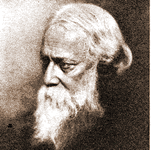|
|
|
|
|
|
| Songs of Rabindranath - by Arnold A. Blake |
 It is not always known in the West that Tagore is not only a poet, but a musician as well. In his work, indeed, poetry and music cannot be separated. Songs form an important part of his creative work and in these, words and melody complete each other. It is not always known in the West that Tagore is not only a poet, but a musician as well. In his work, indeed, poetry and music cannot be separated. Songs form an important part of his creative work and in these, words and melody complete each other.
In his Reminiscences, he writes: ... "1 am always reluctant to publish books ofthe words of my songs, for therein the soul must needs be lacking." And again, speaking of a Baul song: "... Besides, the best part of a song is missed when the tune is absent, for thereby its movement and its colour are lost and it becomes like a butterfly whose wings have been plucked."
... From the musical point of view, Tagore stands at the meeting-place of three different influences: that of European music, that of classical Hindu music (an extremely sophisticated one, bound by strict rules) and thirdly that of the popular religious music of Bengal.
... Later however, Tagore's powerful personality asserted itself, and he threw off both the Western influences of his childhood and youth and that of Indian classical music. Western influence does still appearfleetingly in his songs, but so intimately blended with Indian melodic phrases that their tonality is not altered, only enriched with a novel hue.
... Tagore's achievement as regards the classical music has been as with everything else, that of breaking fetters. His whole life-work is imbued with that appeal to freedom and simplicity, to the spontaneous and youthful elan which no conventions can bind.
... To see him as he really is, rooted in his own soil steeped in an age-long polular tradition which culminates in him, is not to belittle him. Tagore has absorbed this age-long tradition of mystic poetry from the Kirtan songs, the Baul chants, and popular songs (chiefly those of boatmen). In these he found nourishment and help, as well as meterial which he has stamped with his strong personality.
... His style is a simple one, and yetthe melodic contour is not harsh. It is softened by numerous ornamentations: guttural sounds, light, barely suggested appogiature and discreet porlandos. These never obscure or clog up the musical phrase, but rather emphasise it by rendering it softer and more pliiable... Equally simple are his rhythms, especially as compared with those of classical Indian music or Kirtan.
Tagore is quite conscious of the value of his own music compositions. "I have introduced", he said once to Mr. Thompson, "some new elements in our muisc"..."This parallel growth to my poetry. Anyhow, I love this aspect of my activity. I get lost in my songs and then I think that those are my best work; I get quite intoxicated. I, often think that, if all my poetry is forgotten, my songs will live with my countrymen and have a permanent place ... All the same, I know the artistic value of my songs. They have a great beauty. Though they will not be known outside my province, and much of my work will gradually be lost, I leave them as a legacy."
... His works show the great mystical value he attributes to music in common with the Bengali tradition. The Divine Presence is the tune of the mystic flute or of the vibrating strings ofthe Vina, the finest of all Indian musical instruments. The Universe is the song of the Creator, and its music is the heart-beat of the world, which makes us aware of a great communion of love and makes us yearn to melt in Him:
"The world song is never for a moment separated from its singer." - Sadhana
"My master's flute sounds through all things, drawing me out of my lodgings wherever they may be, and while I listen I know that every step I take is in my master's house."
In the Cycle of Spring, Tagore insists: "Is it your custom to answer questions by songs", someone askes. The reply is "Yes, otherwise the answer becomes too unintelligible."
And finally these two sentences out of one of his dramas may serve as a text to his musical works:
"A limitless life of glory can bloom and spend itself in a morning like an endless meaning in the narrow span of a song." - Chitra
From Chansons de Rabindranath Tagore by Arnold A Blake.
|
|
|
|
|
|
|
|